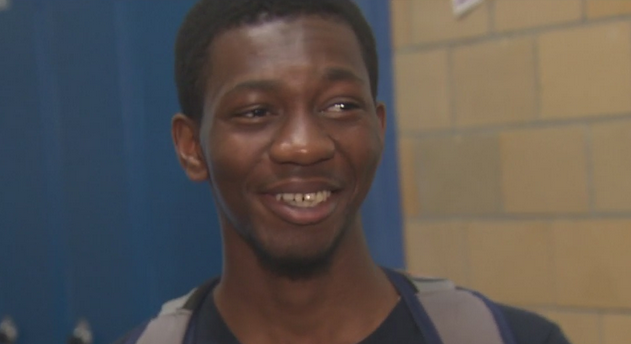 Joe Freddy Francois doesn’t remember how long his family’s house shook. Mostly, he remembers the shock — the actual, physical shock, and the emotional toll that followed.
Joe Freddy Francois doesn’t remember how long his family’s house shook. Mostly, he remembers the shock — the actual, physical shock, and the emotional toll that followed.
He was a child in Port-au-Prince the day an earthqake struck Haiti in January 2010. He was watching television with his sister when they suddenly felt the house move.
At first, they thought little of it.
“But after that the television fell on the ground in front of us,” Francois recalled this week. “It felt like the house was going to fall down. They said it was a minute but it felt so much longer, like it was never going to end. It was a very overwhelming feeling.”
After a chaotic month that included sleeping in cars because their family’s house felt structurally unsound, Joe Freddy and his sister were sent to live with an aunt in Hyde Park. Their parents were worried that the schools in Haiti could be closed for a long time. Francois had been to Boston — once — but didn’t speak English and was still grappling with trauma.
To say he has thrived might be an understatement. Francois is now a 17-year-old high school senior, and on Thursday he will walk across stage as the first valedictorian of the Henderson K-12 Inclusion School in Dorchester, graduating with a grade point average that currently stands at 4.13.
The Henderson does not segregate students by academic ability or special needs; it emphasizes inclusion — hence its name.
It began in 1989 as an elementary school, and then was known as the Patrick O’Hearn school. It has only recently added a high school, and this year’s graduating class will be its first. It was renamed for William Henderson, a visually-impaired man who served as its principal for its first 20 years before retiring a few years ago.
The school’s principal, Patricia Lampron, says Francois represents everything the school is committed to.
When Francois moved to America, the adjustment was dramatic. First, he had to learn the language. Fortunately, he proved to be a fast study. Watching a lot of television helped.
“I learned English mostly by having conversations with people,” he says. “After two months . . . I began to understand what people were saying, even though I couldn’t [respond] fluently. I can’t tell you specifically how I learned it.”
Aside from the language barrier, leaving home had been fraught with emotion. Not only had Francois left his parents behind, he felt a sort of survivor’s guilt for leaving a country in ruins.
“I think when I was leaving Haiti I felt this sense of betrayal,” he said. “A lot of us move to different countries and don’t come back. I didn’t want to be that person to leave and never come back and never think about the country.”
He plans to become an architect. He loves both design and engineering, and figures he can contribute to rebuilding Haiti. His mother is in town for his graduation, and his father arrives next week. His older sister, who was trained as a nurse’s assistant, will be there, too.
Francois was accepted at six colleges, and plans to attend MassArt, to begin his architecture studies. There is, however, a persistent worry about paying for it. He was admitted to the country under Temporary Protected Status, a visa category that renders him ineligible for need-based government financial aid. His principal and teachers have made a crusade of figuring out how to help this gifted student make it through college.
“I think as someone who’s already overcome such adversity in the challenges he has faced, he can overcome this challenge, too,” Lampron, the principal, said.
Francois doesn’t dwell on the challenges. Instead, he talks about gratitude.
“There are people from other countries that don’t have the opportunities I’ve had, especially in Haiti,” Francois said. “I feel privileged to have all these opportunities in front of me.”
Adrian Walker is a Globe columnist. He can be reached at walker@globe.com. Follow him on Twitter @Adrian_Walker.